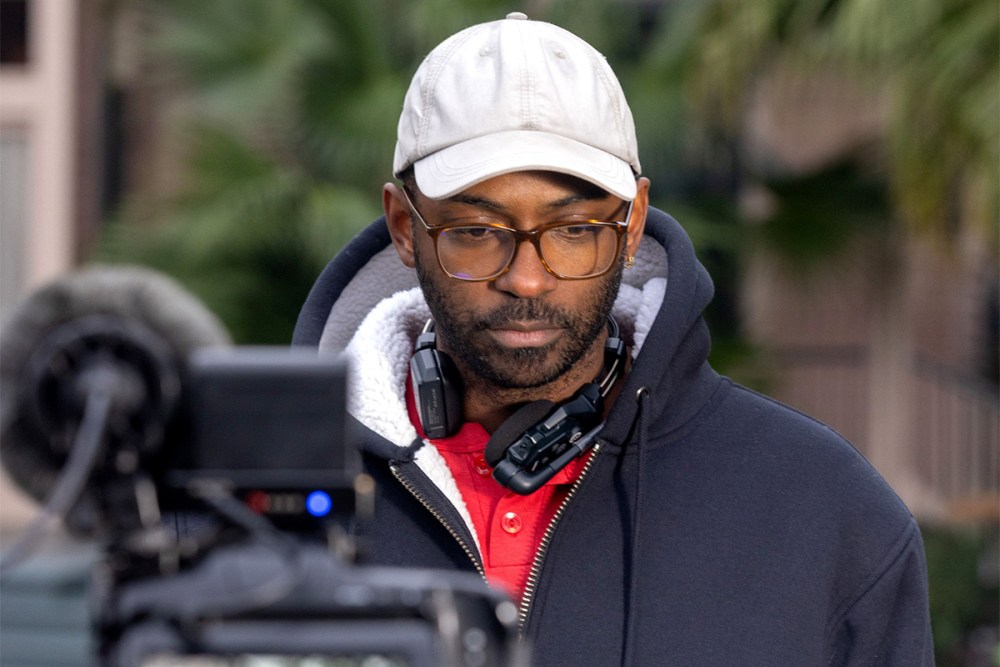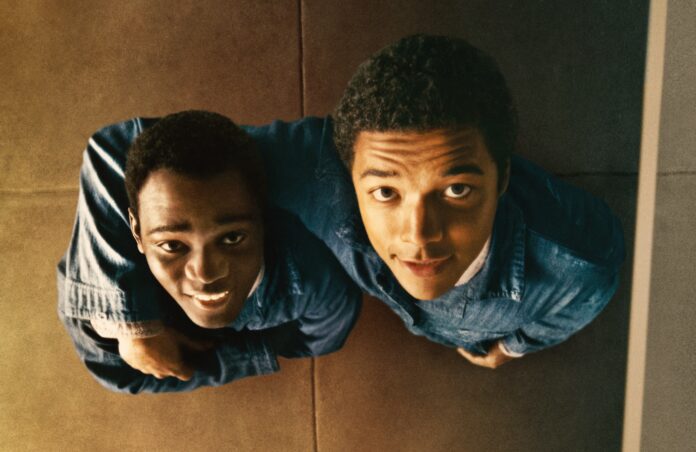When filmmaker RaMell Ross and his co-writer Joslyn Barnes began their work adapting Colson Whitehead’s Pulitzer Prize-winning novel The Nickel Boys into a screenplay, one of the questions confronting them was what they would need to cut from the narrative to make the material suitable for a movie. As part of that process, they determined the essence of the book and arrived at a surprising answer: Love.
“Love was at the core of it, which also just sounds like, ‘Oh, come on, love,’ but it just keeps coming up, because it’s always part and parcel with human experience,” Ross explains during a December visit to the Bay Area to promote the best feature Film Independent Spirit and likely best picture Oscar nominee.
That conclusion does seem counterintuitive to a story that relates the horrors visited upon its teenage protagonists Elwood (Ethan Herisse) and Turner (Brandon Wilson) at Nickel Academy, a juvenile prison farm in Jim Crow Florida. But Ross views the story from a wider lens, and the film, like Whitehead’s novel, begins before Elwood faces indefinite incarceration for simply riding in a car he could not have known was stolen. Before the bad times begin, Elwood is a gifted student growing up in a small Southern town, raised by his grandmother Hattie (Aunjanue Ellis-Taylor).
“Hattie gives Elwood love,” Ross says. “Elwood opens to the love of Martin Luther King. And Martin Luther King’s theories are based on a Christian selfless love, agape. Turner’s open to Elwood’s love, and they started exchanging. And then we know what happens and people live on. What a beautiful, simple way to organize relationships.”
Whitehead based Nickel Academy on a real place, Dozier School for Boys, that was open between 1900 and 2011, a hotbed of physical abuse, rape, and even murder. After the Marianna, Florida, campus closed, state and federal investigators uncovered 55 unmarked graves.
Taking place in two timelines, during Elwood and Turner’s incarceration in the 1960s and 40 years in the future when investigations into Nickel dredge up old memories and set up a reckoning with the past, Nickel Boys is an immersive drama, particularly in the scenes that take place within Nickel. The viewpoint is largely that of the boys’—and as gritty as it is, it is also often poetic. None of this will surprise anyone who saw Ross’ Oscar-nominated documentary Hale County This Morning, This Evening. But that experimental observational film focused on the life of a community not the horrors of a prison. But when Ross read the novel, he knew instinctively how he wanted to approach the material.
“The book elicits such a subjective relationship, you’re constantly in your head with what’s going on and with the images that you’re producing,” Ross says. “And maybe that’s all books. But this one in particular, I think, because I am, essentially, an Elwood and a Turner, at least in terms of the way in which the world, generally speaking, responds, the viewpoint was so attached.
“We get so much information visually, unconsciously, that I think in this film, it’s a little bit more unnerving,” he adds. “You know that that there’s something going on.”
In a way, Nickel Boys is a historical depiction of what’s come to be known as the school-to-prison pipeline, where kids incarcerated as teens or even children face bleak futures of more the same, moved on from youth facilities to adult prisons with little thought given to breaking the cycle. One of Ross’ regrets in having to excise parts of the book to make a movie is leaving out a true delineation of the hard labor to which the young inmates are subjected. There are hints of it on screen, but the film doesn’t delve deeply into the backbreaking work to which the young inmates are subjected.

“There’s a lineage to these places,” Ross says. “Dozier opened in 1900 and closed in 2011. There were children there, even six-year-olds there. What are you teaching that six-year-old? Yeah, other than that life is terrible and it’s never going to get any better? Under-socialized, under-appreciated, and psychologically, just completely dismantled.”
The director credits Ellis with being the glue that holds the film together. Hattie raised Ellis. She remains steadfast through his years at Nickel, despite the best efforts of the academy’s administration to interfere with their relationship.
“She’s the one that that conveys the love that Elwood has into the eyes and hearts of the audience, as the audience is Elwood and Turner,” Ross says. “That’s not only vital for the film and the concept of the film, but it’s actually just quite hard to do, to look into the camera as you would look into the eyes of a loved one, and then, because of the power of her gaze, she allows you to then see the contrast between the way that everyone else in the world looks at Elwood and Turner, who are also you, of course, I think she pulled off a magic trick with that one, because it’s so freaking hard, I could never do it.”
Even after making Nickel Boys, Ross is left with a lingering question he first confronted in Whitehead’s prose, which is the true nature of those inflicting so much damage on these young boys. The administrators and guards are people with families and pets they presumably love. Then they go to work at Nickel, checking their humanity at the gate.
“What’s it take to dehumanize another person, which humanity’s been doing forever?” Ross says. “This is what we do. It seems like anything’s justifiable, yeah, the other way is so much easier.”
NICKEL BOYS opens in Bay Area theaters Fri/3.







